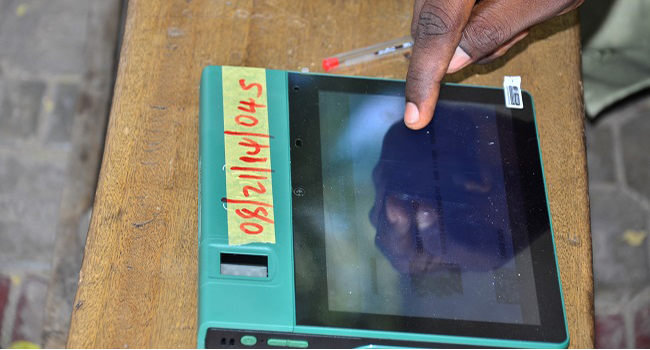Two civic tech organisations, PROMAD and Policy Shapers, have asked the Independent National Electoral Commission (INEC) to publish the comprehensive report of the Bimodal Voter Accreditation System (BVAS) across the country alongside the results of the presidential polls.
According to a joint statement signed by Daisi Omokungbe and Ebenezar Wikina, founders of the organisations, Saturday’s presidential poll showed the promise of Nigeria’s democracy becoming citizen-driven, participatory, and energetic.
However, the civic tech organisations say having keenly watched and read the reports of events in the election, it appears that INEC has not effectively lived up to its obligations and mandate to Nigerians as defined in her 2023 Electoral Guidelines and the 2022 Electoral Act.
“For instance, there are indications of contraventions observed in the processes of the poll across the country, such as late arrival and commencement of voting procedures, relocation of collation centres and failure of the IReV platform.
“According to Connected Development, which deployed 20,000 observers, “we have several reports indicating that states like Ekiti, Cross River, Imo, and Rivers State have had their Local Government Area (LGA) collation centres relocated without adequate information to stakeholders.
“In Ekiti precisely, we have it on good authority that all LGA collation centres were relocated. In most cases, accredited observers were outrightly denied access, and new locations were shrouded in secrecy”.
“INEC itself issued a statement on the challenges they were facing with the Election Results Viewing portal (IReV), a platform they promised to use to aid election transparency and integrity in line with the Electoral Act, 2022.
“According to Section 47 of the Act “(1) A person intending to vote in an election shall present himself with his voter’s card to a Presiding officer for accreditation at the polling unit in the constituency in which his name is registered.
“(2) To vote, the presiding officer shall use a smart card reader or any other technological device that may be prescribed by the Commission, for the accreditation of voters, to verify, confirm, or authenticate the particulars of the intending voter in the manner prescribed by the Commission.
“(3) Where a smart card reader or any other technological device
deployed for accreditation of voters fails to function in any unit and a fresh card reader or technological device is not deployed, the election in that unit shall be cancelled and another election shall be scheduled within 24 hours if the Commission is satisfied that the result of the election in that polling unit will substantially affect the final result of the whole election and declaration of a winner in the constituency concerned”.
“Also in Section 51.—“(2) Where the number of votes cast at an election
in any polling unit exceeds the number of accredited voters in that polling unit, the Presiding officer shall cancel the result of the election in that polling unit.
“(3) Where the result of an election is cancelled in accordance with subsection (2), there shall be no return for the election until another poll has taken place in the affected polling unit.
“(4) Notwithstanding the provisions of subsections (2) and (3) the Commission may, if satisfied that the result of the election will not substantially be affected by voting in the area where the election is cancelled, direct that a return of the election be made,” the statement partly read.
The organisations further stated that INEC must abide by the provisions of the Electoral Act by verifying all the results submitted, mostly manually, through the use of the BVAS report.
They added that from their standpoint as civil society organisations, they are worried that the statement released by INEC over the failure of the IREV reeks of irresponsibility and is at best flimsy. Strong and sure steps must be taken to correct the impact of the identified contraventions.
To improve the transparency and integrity of the election results, the groups urged the Commission to do the following:
INEC should without delay publish all the BVAS accreditation data across all the polling units where elections were held, including the number of voters accredited by fingerprints and facial recognition.
According to YIAGA, BVAS was successfully deployed in about 90% of polling units. This confirms that BVAS data will improve the integrity of the results and help to detect differences that might exist.
INEC cannot downplay the electronic transmission of results at this point of the process. We urge the Commission to restore the IReV platform and scrutinize all the results uploaded with BVAS data before the results are accepted.
There is no way to restitute for the thousands of disenfranchised Nigerians despite having their PVCs and turning out. A public apology to these voters as well as a solid commitment to protect the integrity of the results and the process in the remaining part of this election should be given desired priority. This is not a matter of discretion but that of the law.
All of these must be done as proof of INEC’s accountability and integrity of the collation process. Recall that in October 2022, Prof Mahmood Yakubu was quoted saying, “Let me once again reassure Nigerians that there is no going back on the deployment of the Bimodal Voter Accreditation System (BVAS) for voter accreditation. There is no going back on the transmission of results to the INEC Result Viewing Portal (IReV) in real-time on Election Day.”
PROMAD and Policy Shapers urged the INEC chairman to be responsible and stand accountable for his promise to Nigerians.
They commended sister organisations, security apparatus, the media, ad hoc officials, foreign and local observers, and every Nigerian that is participating in this process to uphold the nation’s democracy and build the Nigeria collectively desired.


